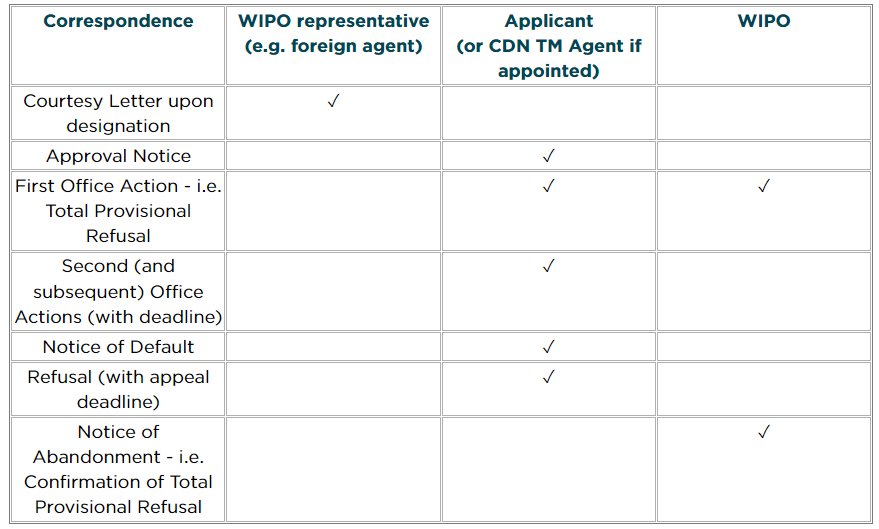If you filed a Madrid application on behalf of your client, and designated Canada, you should have received a “Courtesy Letter” from the Canadian Intellectual Property Office (CIPO) advising you as follows:
Please note that all future correspondence from our Office will be sent directly to the applicant or the appointed Canadian trademark agent
This is the one and only letter you will receive from CIPO in respect of the Canadian application. Thereafter, CIPO will communicate directly with your client. CIPO will also send some (but not all) notices to WIPO.
The following chart provides a non-exhaustive illustration of where CIPO will direct correspondence for a Madrid-originating application:

As noted above, there are important communications which will only be sent to your client. Not only might such communications be unwanted by your client, but also there are important communications (with critical deadlines) which CIPO will not send to WIPO and which will only come to your attention if your client forwards them to you.
To avoid CIPO sending communications to your client, and to ensure that you are aware of all correspondence issued by CIPO (rather than relying on your client to forward such communications to you), you may wish to appoint a Canadian agent for the Canadian application.
Once a Canadian agent is appointed, CIPO will send all correspondence to the Canadian agent and will not send communications to your client. The Canadian agent can then keep you informed of all relevant correspondence and deadlines.
Can I wait to appoint a Canadian agent until receiving an Office Action (Total Provisional Refusal)?
Waiting to appoint a Canadian agent until after receiving an Office Action is not ideal for a few reasons.
First, your client is likely to learn of the Office Action before you do. Second, even if CIPO does not raise any objections against the application (i.e. does not issue an Office Action), it will still send communications directly to your client (e.g. the Approval Notice), which might be undesirable. Third, there might be correspondence from third parties (e.g. demand letters) which will be sent directly to your client in the absence of a Canadian representative.
Since CIPO issues Office Actions in the vast majority of cases, and since the services of a Canadian agent will most likely be needed in any event, many foreign firms choose to appoint a Canadian agent upon receipt of the “Courtesy Letter”.
For more information about appointing our firm as your Canadian agent for such communications, please contact a member of our Trademarks & Brand Protection team.
The preceding is intended as a timely update on Canadian intellectual property and technology law. The content is informational only and does not constitute legal or professional advice. To obtain such advice, please communicate with our offices directly.
Related Publications & Articles
-
Canadian trademark law 2025: a year in review
2025 marked a year of adaptive reform in Canadian trademark law. Decisions, legislative updates, CIPO initiatives, and procedural enhancements collectively show the system continuing to mature in the ...Read More -
Federal Court confirms test for leave to file new evidence in appeal from Opposition Board Decision
As of April 1, 2025, subsection 56(5) of the Trademarks Act requires parties to obtain leave to file additional evidence on appeal from decisions of the Registrar of Trademarks (the “Registrar”), whic...Read More -
Top five 2025 trends in Canadian copyright law
2025 saw incremental developments in Canadian copyright matters anticipated to set the foundation for potentially major changes in the coming years in AI and accessible remedies for infringement and h...Read More
